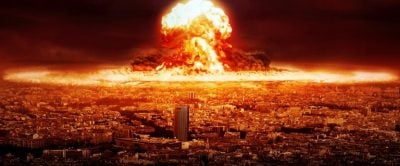Mac Slavo
SHTFplan.com
24 May 2018
 The government has already prepared some scripts to use on the
terrified public should the United States ever be attacked with a
nuclear weapon. The US government prepares for all sorts of threats, but
none match the pomp and circumstance they’ll display in the event of
a nuclear explosion.
The government has already prepared some scripts to use on the
terrified public should the United States ever be attacked with a
nuclear weapon. The US government prepares for all sorts of threats, but
none match the pomp and circumstance they’ll display in the event of
a nuclear explosion.
Prepared scripts for many disaster scenarios are already written ranging from biowarfare and chemical weapons to volcanoes and wildfires. The good news is that the Cold
War is over and a limited nuclear strike or a terrorist attack can be survivable (a direct hit notwithstanding). The bad news is that the government’s plans for survival don’t really include you anyway. Couple that with a new arms race which is already underway, albeit shrouded in secrecy, and one that may add small, portable nuclear weapons to the global stockpile. Lawmakers and experts fear such “tactical” or battlefield-ready devices (and their parts) may be easier for terrorists to obtain via theft or sale.
And even a small nuclear weapon on the ground can create a stadium-size fireball, unleash a city-crippling blastwave, and sprinkle radioactive fallout hundreds of miles away. In this case, it’s important to be prepared for this scenario, even if it’s unlikely to play out.
According to Business Insider, a nuclear terrorist attack of this magnitude is one of 15 major disaster scenarios planned for by FEMA and other US agencies. (The same scenario also includes a dirty bomb explosion, though such an event would be dramatically less harmful.)
As part of the planning effort, the Environmental Protection Agency (EPA) maintains a series of manuals about how state and local governments should respond. A companion document anticipates 99 likely questions during a radiation emergency and scripted messages that officials can copy or adapt.
Source: https://www.globalresearch.ca/heres-how-the-u-s-government-will-calm-the-public-if-a-nuclear-attack-occurs/5642036
SHTFplan.com
24 May 2018

Prepared scripts for many disaster scenarios are already written ranging from biowarfare and chemical weapons to volcanoes and wildfires. The good news is that the Cold
War is over and a limited nuclear strike or a terrorist attack can be survivable (a direct hit notwithstanding). The bad news is that the government’s plans for survival don’t really include you anyway. Couple that with a new arms race which is already underway, albeit shrouded in secrecy, and one that may add small, portable nuclear weapons to the global stockpile. Lawmakers and experts fear such “tactical” or battlefield-ready devices (and their parts) may be easier for terrorists to obtain via theft or sale.
And even a small nuclear weapon on the ground can create a stadium-size fireball, unleash a city-crippling blastwave, and sprinkle radioactive fallout hundreds of miles away. In this case, it’s important to be prepared for this scenario, even if it’s unlikely to play out.
According to Business Insider, a nuclear terrorist attack of this magnitude is one of 15 major disaster scenarios planned for by FEMA and other US agencies. (The same scenario also includes a dirty bomb explosion, though such an event would be dramatically less harmful.)
“Ideally, these messages never will be needed,” the EPA says in its messaging document. “[N]evertheless, we have a responsibility to be prepared to empower the public by effectively communicating how people can protect themselves and their families in the event of a radiological or nuclear emergency.”Here’s an example of what the government will tell people to try to prevent widespread panic:
“Lives have been lost, people have been injured, and homes and businesses have been destroyed. All levels of government are coordinating their efforts to do everything possible to help the people affected by this emergency. As lifesaving activities continue, follow the instructions from emergency responders… The instructions are based on the best information we have right now; the instructions will be updated as more information becomes available.”So basically, they demand you follow their orders. Nothing out of the ordinary for the government. Comply and do what we say. This is why so many prepare in advance for a wide array of scenarios. That way, they don’t have to “obey” and “comply with orders” or go to a FEMA camp just to survive.
Source: https://www.globalresearch.ca/heres-how-the-u-s-government-will-calm-the-public-if-a-nuclear-attack-occurs/5642036
Comments
Post a Comment